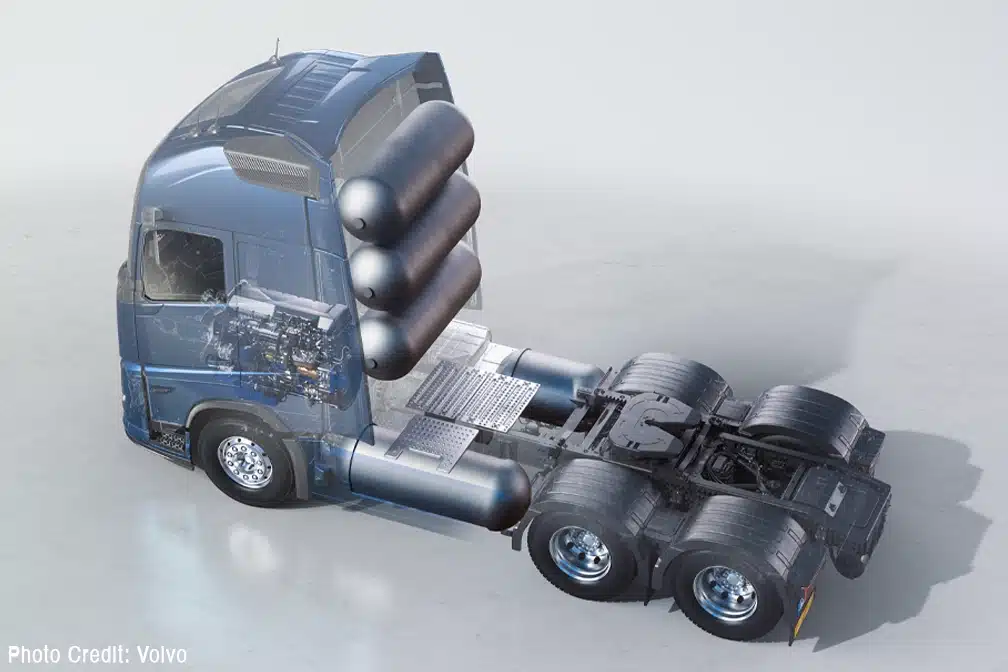July 27, 2024 6:24 am
BRINGING THE AMERICAN TRUCK DRIVER THE LATEST TRUCK DRIVER NEWS

Hydrogen-Powered Trucks: Volvo’s Sustainable Internal Combustion Engine
Volvo Trucks is taking a significant leap forward in the pursuit of sustainable transportation with the development of trucks powered by hydrogen combustion engines. This innovative approach is set to revolutionize the trucking industry, offering an alternative to traditional diesel engines and complementing Volvo’s existing lineup of electric and renewable fuel-powered vehicles. Here’s what truck drivers and industry stakeholders need to know about this exciting development.
Hydrogen Combustion Engines: How They Work
Volvo’s new hydrogen-powered trucks utilize High Pressure Direct Injection (HPDI) technology. This system injects a small amount of ignition fuel at high pressure to start the engine, followed by the introduction of hydrogen. This method not only ensures reliable engine performance but also maximizes energy efficiency and power while minimizing fuel consumption.
Hydrogen-powered combustion engines offer the same performance and reliability as traditional diesel engines but with the added benefit of potentially achieving net-zero CO2 emissions from well-to-wheel when using renewable fuels such as Hydrotreated Vegetable Oil (HVO). These engines are categorized as Zero Emission Vehicles (ZEV) under the new EU CO2 emission standards.
Advantages for the Trucking Industry
Hydrogen combustion engines provide several benefits that make them particularly appealing for the trucking industry:
- Operational Range: The range of hydrogen-powered trucks is comparable to that of diesel trucks, making them suitable for long-haul transport.
- Flexibility: These trucks are ideal for regions with limited charging infrastructure, where electric trucks may face operational challenges.
- Environmental Impact: Hydrogen combustion results in very low CO2 emissions, and the trucks are expected to emit minimal nitrogen oxides and particles, contributing to cleaner air.
- Performance: The HPDI technology ensures high engine power and efficiency, essential for heavy-duty applications.
Upcoming Trials and Market Launch
Volvo plans to begin customer tests with hydrogen-powered trucks in 2026, with a commercial launch expected towards the end of the decade. The company is already conducting lab and vehicle tests to ensure these trucks meet the rigorous demands of the trucking industry.
Collaboration and Research Initiatives
Volvo Group is committed to advancing hydrogen combustion technology through collaboration and research. The company has established a joint venture with Westport Fuel Systems to utilize HPDI technology in its trucks. This joint venture is anticipated to become operational in the second quarter of 2024.
Furthermore, Volvo is supporting academic research by initiating PhD scholarships focused on hydrogen combustion engine technology. These scholarships, conducted at Chalmers University of Technology and Lund University in Sweden, aim to secure continued expertise in this field and drive innovation in hydrogen-powered propulsion.
Complementing Existing Technologies
Hydrogen combustion engines are part of Volvo’s multi-faceted approach to decarbonizing heavy transport. The company already offers battery electric trucks, fuel cell electric trucks, and trucks powered by renewable fuels like biogas and HVO. This diverse range of technologies allows customers to choose the best solution based on their specific transport needs, available infrastructure, and energy prices.
Future Prospects and Industry Impact
Volvo’s commitment to hydrogen-powered trucks underscores the importance of varied propulsion technologies in achieving sustainable transportation. While hydrogen engine trucks might be more expensive initially, political decisions and fuel costs will influence their total cost of ownership.
Hydrogen combustion engines are particularly suited for high constant power applications and hot climates, addressing some limitations of battery electric and fuel cell electric trucks. As the trucking industry evolves, these hydrogen-powered trucks will play a crucial role in reducing emissions and meeting environmental targets.
Looking Ahead
Volvo’s development of hydrogen-powered trucks marks a significant milestone in the journey towards greener transport solutions. For truck drivers and industry stakeholders, this innovation promises enhanced performance, operational flexibility, and a reduced environmental footprint. As these trucks enter the market in the coming years, they will undoubtedly contribute to a more sustainable future for heavy transport.
Photo Credit: Volvo Trucks
Recent Posts
Copyright 2024. All Rights Reserved.
